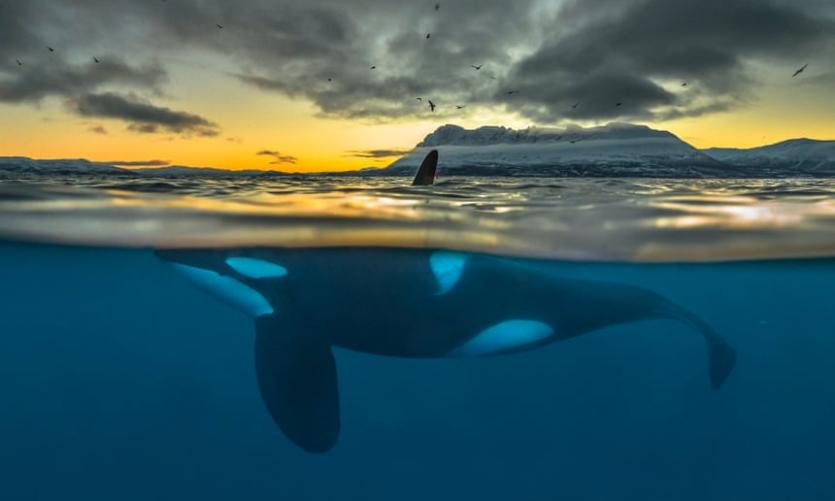Split-view of a killer whale at sunrise off the coast of northern Norway. Photograph: Audun Rikardsen/Science
 SEPTEMBER 28th, 2018
SEPTEMBER 28th, 2018
By Patryk Krych | The World Daily
Potential Orca extinction over PCB chemical leaks
A new study has revealed that the constant toxification and pollution of the world’s ocean is doomed to cause the extinction of over half the orca population, largely due to PCB chemicals. The only eventually refuge for these killer whales may be the Arctic, when it comes down to it.
Over the course of the next 30-50 years, the population of offshore nation killer whales could vanish entirely with the pollution of PCB chemicals, which are known to cause cancer and damage internal organs. The chemicals, despite having been banned for nearly decades, are still very much an issue, as the study has made clear, still leaking into the ocean at excessive rates that pose a threat to the orcas.
With many other oceanic species ingesting the chemicals, and killer whales being so close to the top of the food chain, they suffer the greatest consequences of PBC poisoning, making them the greatest targets of the disaster. Along with this, the poison is transferable through their milk, to their new-borns, causing early contamination to their next generations.
Paul Jepson of the Zoological Society of London, and a member of the international research team behind the study, “It is like a killer whale apocalypse. Even in a pristine condition they are very slow to reproduce,” It takes killer whales nearly 20 years to reach sexual maturity, and many of them may not even be healthy enough to reach that age before long.
“I think the Stockholm Convention is failing,” he said. “The only area where I am optimistic is the US. They alone produced 50% of all PCBs, but they have been getting PCB levels down consistently for decades. All we have done in Europe is ban them and then hope they go away,” Of course referring to the international Stockholm Convention on Persistent Organic Pollutants, a convention meant to slow down the PCB poisonings back in 2004, despite having begun behind schedule.
Recently, the highest PCB records were recorded after a death in the UK, where the most risk is present at the moment for orcas. Other groups in the Pacific, and near Gibraltar are also under threat, and have already disappeared in the North Sea. The safest place for killer whales, in the end, may be the ocean around the Atlantic, or generally near the north oceans around Iceland, Norway, and Canada, being farther away from PCB contamination sources.
Jepson continued; ”The only thing that gives me hope about killer whales in the longer term is, yes, we are going to lose populations all over the industrialised areas, but there are populations that are doing reasonably well in the Arctic.”
Along with this, the researchers have also mentioned that PCB is not the only dangerous chemical found that could cause threat to the whales, adding that there was a “a long list of additional known and as yet unmeasured contaminants present,” with one of the problems including the disappearance of some of their most key prey.
The deputy director at conservation group Orca, Lucy Babey, had stated; “Our abysmal failures to control chemical pollution ending up in our oceans has caused a killer whale catastrophe on an epic scale. It is essential that requirements to dispose safely of PCBs under the Stockholm Convention are made legally binding at the next meeting in May 2019 to help stop this scandal.”
Having been published recently in the Science Journal, the new study showed the largest analysis of the situation to date, with an investigation of the PCB contamination of 351 killer whales. The study also examined how the chemicals effect calf immune system, and their potentials for surviving the onslaught of poison, concluding; “Populations of Japan, Brazil, Northeast Pacific, Strait of Gibraltar, and the United Kingdom are all tending toward complete collapse.”
Chair of the Wildlife and Countryside Link’s whales group, Jennifer Lonsdale, said; “This new study is a global red alert on the state of our oceans. If the UK government wants its [proposed] Environment Act to be world-leading, it must set ambitious targets on PCB disposal and protect against further chemical pollution of our waters.”
By Patryk Krych | The World Daily
©2018 THE WORLD DAILY






